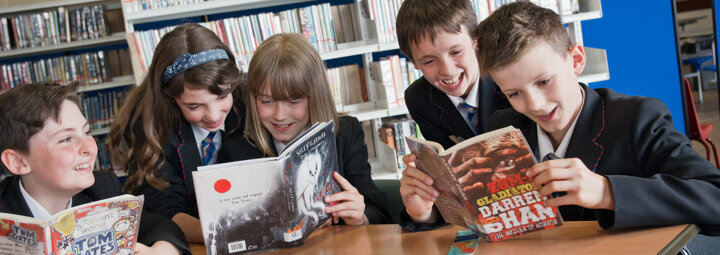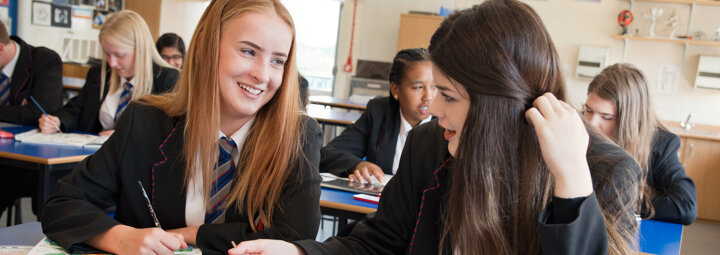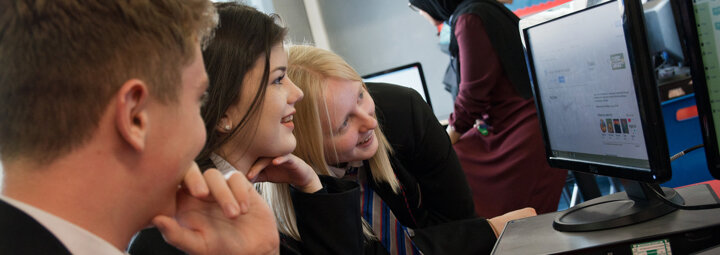Bramcote College KS3 Curriculum
Our curriculum at KS3 is based on the National Curriculum and intends to support all our students to make clear progress and build the skills and knowledge they need for success at school and beyond.
We recognise the value of diverse cultures and experiences, and carefully consider our students when planning their learning. This leads to a broad, balanced and challenging curriculum, which meets the needs of all our learners.
We take a personalised approach to curriculum planning with high aspirations alongside effective support for all including those with disabilities and SEN. We encourage a creative approach to learning and allow students to pursue their passions and find joy in their education.
We take care to structure our curriculum in a coherent and logical sequence, promoting links between subjects and opportunities for enrichment.
If you would like to find out more about the curriculum in any of our subjects, please contact the Curriculum Leader, or Jenny Read (Deputy Headteacher: Quality of Education).
At Key Stage 3 we follow National Curriculum guidelines which enables students to experience a range of starting points and materials in order to develop their skills, confidence and creativity. Students learn and practise a wide range of skills and techniques that are built on over the key stage to help prepare them for the next stage of working at GCSE. Students also learn about a wide range of art and design genres, which helps them understand how important and influential artists and designers are in the world today as well as the past.
The aim of the Art department is to nurture the confidence of our students in art and design. Students learn about a wide range of skills and techniques that are built on over each key stage to help them become accomplished artists and designers by the time they leave Bramcote College. Students also learn about a wide range of art and design genres, which helps them understand how important and influential artists and designers are in the world today as well as the past.
We aim to develop all students into effective practitioners in the workplace who:
- Are inspired and inquisitive; asking and answering questions about how technology has evolved and how it is used in the world (past and present).
- Can confidently use a wide range of software and are fully prepared for the demands of being a 21st digital citizen.
- Are successful in life and the working environment.
- Can begin to develop the knowledge and skills necessary to progress to GCSE and A-level Computer Science.
|
|
Autumn 1 |
Autumn 2 |
Spring 1 |
Spring 2 |
Summer 1 |
Summer 2 |
|
7 |
Introduction to Office 365, Teams |
E-Safety |
Modelling using Excel |
Computational Thinking |
Block Based Programming |
Programming Challenges |
|
8 |
Hardware & Software |
Ethics – Impact of technology on crime |
Pixlr – Creative image editing project |
History of Computing & Binary |
Programming Constructs – Edublocks |
Programming Constructs – Edublocks |
|
9 |
Careers in Computer Science |
Computational Thinking |
Programming in Python |
Data Representation |
Legal, Social & Moral |
A.I. |
Our KS3 Drama Curriculum aims to develop students as drama practitioners who are confident, creative and imaginative. Students start in Year 7 by applying basic drama concepts and techniques, such as tableaux, physical theatre, still imagery and characterisation. They begin to critically evaluate their work and the work of others. In Year 8, students develop their skills from the previous year and become more careful, precise and methodical, employing a wider range of drama concepts and techniques. Our Year 9 Drama Curriculum focuses on students drawing upon their wealth of concepts and knowledge to enhance their work, reflecting on the philosophies of famous and classic theatre practitioners to aid in mastering their own practice in preparation for KS4.
|
|
Autumn 1 |
Autumn 2 |
Spring 1 |
Spring 2 |
Summer 1 |
Summer 2 |
|
7 |
Curse of Queen Naffytutut |
|
Greek Theatre |
|
Physical Theatre |
|
|
8 |
Creating |
Superhero (Developing Character) |
Devising Techniques (Creating from a stimulus) |
Devising Techniques Continued |
Shakespeare Plays (A Midsummer Nights Dream/Romeo and Juliet) |
Shakespeare Plays (Modern Interpretations) |
|
9 |
Blood Brothers |
Commedia Dell’arte |
Page to Stage (Blackout/ Backstage) |
Drama Practitioners |
Drama Practitioners (chosen style) |
Theatre In Education |
Our subject is inspiring, it impacts on all other subjects and is the language of communication. We encourage students to be critical readers, writers, critics, and to articulate themselves as eloquent, confident communicators. We also build understanding of relationships and focus on personal growth, giving students opportunities to be creative, to develop skills that are essential for life beyond school and for future careers. Through reading, through the spoken and written word, students can enter new worlds, improve communication, and have a wealth of experiences. Built around several key concepts, at the heart of our curriculum are the virtues, positive traits and moral messages that we want our students to take away.
Our KS3 Curriculum Plan
Year 7: students study characters and settings, while learning to appreciate and celebrate their own character.
Year 8: analysis of different structures and perceptions of structures.
Year 9: study of a range of genres, evaluating topics linked by theme in preparation for GCSE.
We aim to develop students into thoughtful and informed geographers who understand both human and physical processes, appreciate diverse global perspectives, and recognise their role in promoting sustainability. Through a spiral curriculum and the study of varied global biomes, students build on prior knowledge to explore the complex relationships between people and environments across social, political, and cultural contexts.
|
|
Autumn 1 |
Autumn 2 |
Spring 1 |
Spring 2 |
Summer 1 |
Summer 2 |
|
7 |
British weather |
Extreme weather |
Rainforest physical geography |
Rainforest uses |
Africa |
Africa |
|
8 |
Earthquakes |
Volcanoes |
Japanese geography |
Japanese culture |
Physical geography of deserts |
Human geography of deserts |
|
9 |
Antarctica as a wilderness |
Using Antarctica |
Fashion |
Globalisation |
Global threats |
Global threats |
At key stage three students study the story of Britain from 1066 onwards. While the story focuses on the British Isles, we try to include the history of all groups who have formed the fabric of our society including studies of the Suffragettes and their fight for the vote, the British Empire in India and a history of Hong Kong. This is to help students understand the diversity within our society. An international focus is taken through studies of German and Soviet dictators as well as a depth study on civil rights in the USA. Beyond the curriculum we aim to bring history to life giving multiple opportunities for enrichment through off-site visits to historical sites such as the National Justice Museum and the National Holocaust Centre and on-site experiences through the National Archives.
|
|
Autumn 1 |
Autumn 2 |
Spring 1 |
Spring 2 |
Summer 1 |
Summer 2 |
|
7 |
What is History? |
Norman Conquest |
Medieval Life |
Power of the Monarchy: A study of medieval monarchy. |
Religion in the Tudor Age |
The Civil War |
|
8 |
Industrial Revolution |
Power to the People |
Slavery |
The British Empire |
Migration through Time |
Migration through Time |
|
9 |
World War I |
Rise of the Dictators |
The Holocaust |
World War II |
The Cold War |
Civil Rights in the USA |
At Bramcote College we believe every student can be successful in maths and make progress with the subject. Our curriculum is based on developing a balance between developing pupils’ procedural fluency and conceptual understanding in the subject, and ensuring links are made with prior learning in a coherent sequence.
*Topics studied by Higher tier classes only
The MFL curriculum at KS3 aims to develop students' ability to communicate effectively and confidently in Spanish, while laying strong foundations for progression to GCSE and further language study. It also seeks to promote an appreciation of different cultures and perspectives, encouraging resilience, curiosity, and independence in language learning. Ultimately, the curriculum is designed to create well-rounded students who are inquisitive, creative, and confident.
Year 7: Foundations of Language Learning - Phonics, basic vocabulary, present tense structures, and personal identity.
Year 8: Broadening Language Use - Describing experiences, consolidating grammar, and expanding vocabulary.
Year 9: Preparing for GCSE - Greater fluency, accuracy, and readiness for GCSE topics.
In Year 9, we also offer students the opportunity to study German.
Our KS3 Music curriculum aims to develop students as musicians who are skilled, confident and creative. Students start in Year 7 by developing their understanding of the basic musical elements and quickly move to applying these in a practical setting. Students learn to play the ukulele and begin their journey towards mastering the art of playing keyboard. Through this, students learn to perform as both soloist and ensemble member and develop their dexterity and fine motor control: both being essential life skills. With regular performance opportunities students begin to develop confidence and learn to critically evaluate their work and the work of others.
In Year 8, students build on and develop their skills from the previous year to become more careful, precise and methodical, employing a wider range of musical concepts and techniques.
Our Year 9 Curriculum is designed to allow students to deepen their understanding and appreciation of music from different cultures and time periods, as well as honing skills on keyboard and their chosen instrument. The key stage ends with a vocational style unit where students work in groups to plan and project manage a professional music event.
We aim to provide a curriculum and opportunities which promote a love of music in all our students. Please see below for details of our music development plan:
“Work Hard. Be Well. Do Well.” - Be Well is a core aspect of life at Bramcote college, and Personal Development & RS (Religious Studies) forms part of our foundation to “Being Well”.
Religious Studies & Personal Development aims to develop empowered individuals who are able to thrive in our modern world, taking an active role in society and maintain healthy relationships. Our curriculum underpins core British Values, enabling students to become confident, inclusive, accepting & understanding individuals. They will become skilled in thinking critically, reasoning and justifying their own ideas about spiritual, cultural and moral concepts as well as being able to challenge the ideas of others in a respectful manner.
We follow a spiral curriculum with 4 main areas that are revisited each year:
- Relationships and Sex Education,
- Health and Wellbeing,
- Living in the Wider Word,
- Religious Studies
Topics and themes are introduced to match the developmental stage of students and revisited to deepen knowledge & refine skills.
Parents have the right to withdraw their children from religious education and/or collective worship.
From age 16, pupils can choose for themselves to opt out of collective worship if they wish. However, they cannot opt out of receiving religious education without parental consent until they are 18.
Please contact the school if you would like to discuss the withdrawal of your child from any aspect of Religious Education.
PE at Bramcote College aims to provide a broad, engaging and challenging curriculum that allows all students to achieve beyond their expectations. As well as improving performance in a range of sports and activities, we also aim to develop the social and emotional well-being of our students.
Priorities
- Offer a wide variety of sporting opportunities
- Build strong characters
- Gain an understanding of the benefits of physical activity
- Achieving excellence (not just in performance)
- Encouraging a lifelong enjoyment of physical activity.
The PE curriculum is flexible and can be tailored to suit the specific needs of the students. We offer excellent opportunities to develop a healthy life-long love of physical activity through first class teaching and learning, building successful, employable and physically active young people with a skill set that can be used throughout life.
Students will develop physical, personal, technical and cognitive skills; enhanced by an embedded focus on values such as resilience, respect and confidence. They will experience a variety of opportunities and experiences that support this vision, challenging them inside and outside the classroom. Students will focus on improving their health, fitness and well-being through knowledge and application. Leadership skills also take a strong emphasis throughout, with students being able to take on additional roles other than just a performer.
Year 7 & 8 : In year 7 and 8 students will focus on improving their physical, social and emotional wellbeing through engaging in a wide range of sports and physical activities. They will become more competent, confident and expert in their techniques, and apply them across different sports. They should understand what makes a performance effective and how to apply these principles to their own and others’ work. Students are assessed through the concepts of Physical, Personal, Social & Cognitive skills in PE.
|
KS3 PE |
Half Term 1 |
Half Term 2 |
Half Term 3 |
Half Term 4 |
Half Term 5 |
Half Term 6 |
|
Year 7 & 8 Students have 2 lessons per week |
Practical- one team activity & one individual activity from:
*may fall into Spring Term due to facilities |
Practical one team activity & one individual activity from: from:
|
All students study
And three activities from …
|
|||
|
Year 9 Students have 1 PE lesson per week |
*may fall into Spring Term due to facilities |
|
All students study
And two activities from …
|
|||
|
Year 9 Sports Leaders
|
|
|
|
|||
Within the Science Faculty, we endeavour to deliver an inspiring and relevant curriculum, preparing students for a global society where science and innovation is at the forefront of technological developments. Our curriculum is delivered within a nurturing environment, founded on strong relationships between our staff and students. The curriculum across all key stages and disciplines is designed to engage, enthuse and challenge through development of skills in research, investigation, analysis and evaluation. We encourage our students to be curious, independent, confident thinkers who will persevere until they are successful at solving the most challenging problems. The science curriculum allows our students many opportunities to consider their responsibilities within the wider world, enabling them to reflect on the ethical and moral issues associated with scientific progression. This enables them to consider multiple viewpoints and express their own opinions with confidence and integrity.
Our KS3 Curriculum Plan:
(Topics are taught on rotation across the terms)
At Bramcote College, our Design and Technology curriculum aims to equip students with the creative, technical, and practical skills needed to become resourceful problem-solvers and innovative thinkers. We believe that D&T is essential for preparing pupils to participate confidently and successfully in an increasingly technological and rapidly changing world.
Our intent is to inspire Creativity, here at Bramcote College we provide opportunities for students to explore and express their creativity through the design and creation of functional products. Develop technical knowledge: We ensure pupils acquire a strong foundation in materials, components, tools, and processes, including digital technologies, to support their design decisions and construction techniques. Promote Critical Thinking: Encourage students to research, design, make, and evaluate thoughtfully—reflecting on their work and the work of others to improve and refine their ideas. Foster Resilience and Collaboration: Develop skills such as teamwork, communication, and perseverance by working collaboratively and responding positively to challenges. Build Life Skills and Career Awareness: Provide insight into careers in engineering, product design, fashion, food technology, architecture, and manufacturing—broadening students’ horizons and aspirations. Through a well-structured and progressive curriculum, we aim to nurture confident designers, engineers, and innovators of the future who can make thoughtful, responsible contributions to the world around them.
At KS3 students follow a carousel system studying all 4 subjects. Please note they might not follow in the order shown below.


